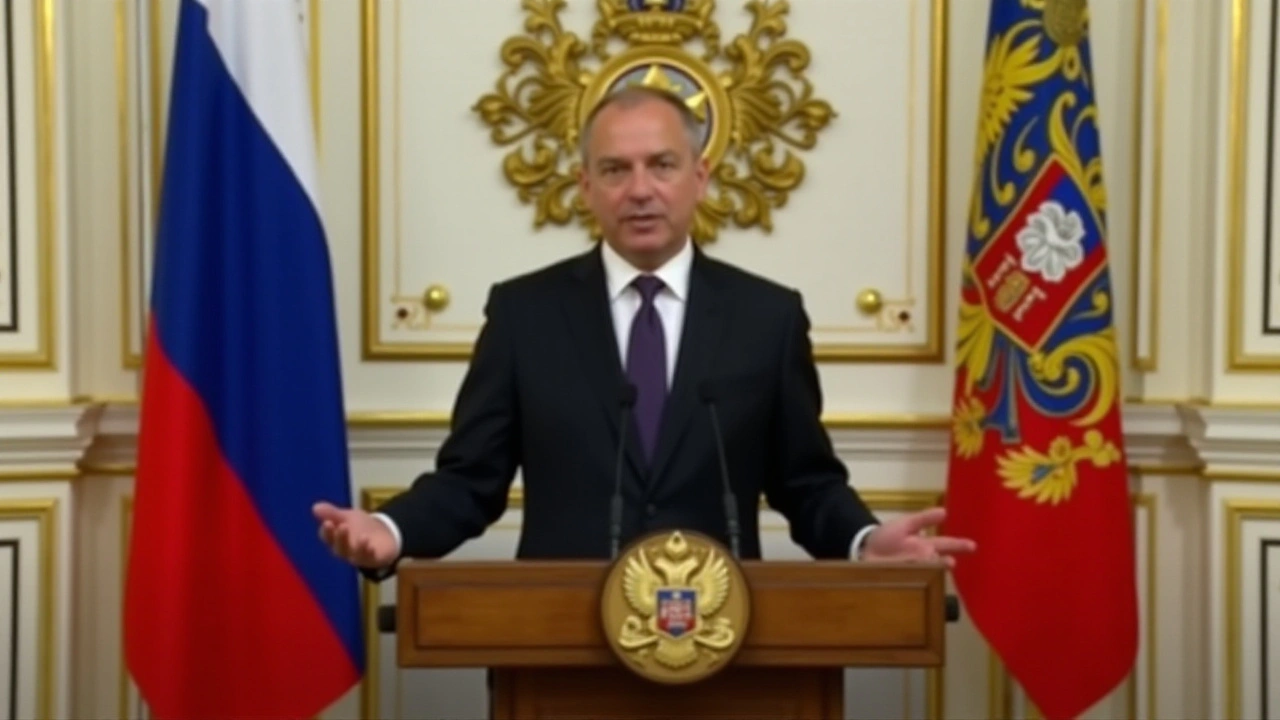An Analysis of Medvedev's Statements on a Trump Presidency
In an unexpectedly forthright statement, Dmitry Medvedev, the former President of Russia and now a notable figure within the Russian government, shared his thoughts on the implications of a potential return to power for Donald Trump in the United States. Medvedev, who holds the significant position of Deputy Chairman of the Russian Security Council, discussed the prospective changes on his official Telegram account. According to Medvedev, a Trump presidency could usher in a new era of hardships for Ukraine, primarily stemming from Trump's business philosophy and reluctance to fund extranational obligations.
Trump's Business Acumen: A Double-Edged Sword
Medvedev's remarks were particularly pointed concerning Trump's approach to global partnerships and financial aid. As a businessman, Trump has historically been known for scrutinizing financial commitments overseas. Medvedev suggested that Trump's aversion to spending excessively on what he referred to as 'stupid allies' and 'greedy international organizations' might extend to Ukraine. This view posits Trump as a pragmatist prioritizing domestic economics over international tour-de-force, potentially leaving the Ukrainian government under President Vladimir Zelensky in a precarious position regarding U.S. financial support.
Potential Shift in U.S.-Ukraine Relations
The potential reduction in support from Washington is a topic of high concern for Ukraine, still embroiled in the tumultuous aftermath of the 2022 Russian invasion. Medvedev hinted that Ukrainian officials would need to brace for a less supportive U.S. administration, should Trump succeed. Despite Trump’s previous resistance to such commitments, Medvedev acknowledged a possible counterforce from within the U.S political and military system, which usually wields significant influence over executive decisions on international military aid.
Reactions and Strategic Implications
The Kremlin's reaction to this hypothetical scenario was one of caution and strategic anticipation. Kirill Dmitriev, the CEO of Russia's sovereign wealth fund and a steward of Russian economic strategies, saw an opportunity for rekindling diplomatic ties between Moscow and Washington. Dmitriev, an influential figure who had past interactions with Trump's circle, described Trump's victory as possible thanks to overcoming orchestrated campaigns against him, suggesting a genuine alignment of the American public with Trump's policies.
Dmitriev's optimism mirrors those within political corridors who hope for a progressive thaw in the icy U.S.-Russia relations. Dmitriev indicated that the potential shift towards transactional diplomacy under Trump might ease some of the tensions reminiscent of the nearly six-decade-old Cuban Missile Crisis.
A Historical Context: Russia-U.S. Relations
The backdrop to these developments is a historical continuum of distrust and strategic rivalry between Russia and the United States. Ever since Trump's initial victory in 2016, suggestions of better bilateral relations have emerged periodically, though they remain largely symbolic due to staunch bureaucratic and ideological barriers. Still, the Kremlin appears cautiously optimistic about fostering a working relationship with a possibly reelected Trump administration.
The 2024 Election Landscape
The prospect of Trump's return to the presidential stage, after having been projected by Fox News to win over Democrat Kamala Harris, adds an intense dynamic to the already complex U.S. political arena. A Trump comeback could signal a divergence from the Biden administration's policies, which the Russian diplomatic community deems hostile. Medvedev's forewarnings and its bearings on future policies provide an interesting subplot as international observers tune into this evolving scenario on the geopolitical chessboard.
As the world watches these pieces fall into place, Ukraine, along with several other globally significant players, waits anxiously—their fates potentially tied to decisions made thousands of miles away in the American heartland.







John Crulz
Medvedev’s warning about a Trump administration sounds like another chapter in the endless US‑Russia chess game. He points out that Trump’s business mindset could make him treat Ukraine as a “stupid ally” and cut aid. Even if the White House is split, the Treasury and Pentagon still have a lot of say. That internal push‑back could keep some money flowing, but the tone will definitely shift. It’s a reminder that personal style in the Oval Office can ripple all the way to Kyiv.
Anita Drake
It’s easy to forget how much ordinary Ukrainians depend on that “stupid ally” label. When you look at the real‑world impact-hospital supplies, food trucks, and winter heating-their lives literally hinge on continued assistance. Medvedev’s speculative tone might be strategic, but the human cost is concrete. Even a modest reduction in aid could stall reconstruction projects that have already stretched thin. The U.S. political system does have checks that can override a president’s whims, yet the signal sent by a Trump victory would still be unsettling. Communities on the front lines would feel the anxiety before any official policy changes. So the diplomatic dance isn’t just about high‑level rhetoric; it’s about everyday survival.
Eduardo Lopez
Wow, Medvedev really laid it on thick, didn’t he? He’s basically saying that if Trump walks back into the White House, the whole “America the world’s police” act will turn into a “America the world’s accountant.” That’s drama gold, but also a stark reminder that geopolitics often mirrors a boardroom. Trump’s business history shows he loves a good bargain, and he’s never been shy about slashing contracts that don’t line his pockets. So why would he suddenly start sprinkling cash on Ukraine like it’s free candy? The idea that he’d call it “stupid ally” sounds like a headline, yet the underlying logic isn’t far‑fetched. The U.S. Congress and the Pentagon have their own budgets and can still push aid through, but the President sets the tone and can veto or stall. Medvedev’s comment also hints that Russia might try to exploit any U.S. hesitation, perhaps by stepping up their own support for separatists or simply using the distraction to consolidate gains. It’s a classic “divide and conquer” play. Meanwhile, Kyiv is sitting on a precarious ledge, hoping that the West won’t pull the rug out from under them. If Trump’s administration slashes aid, it could embolden Russia’s hardliners and make peace talks that much harder. On the flip side, some Russian officials, like Dmitriev, are oddly hopeful that a Trump win could thaw relations-though that optimism feels more like wishful thinking than a solid forecast. The reality is, a Trump presidency would probably inject a lot of uncertainty into the already volatile Ukraine‑Russia saga. And uncertainty, as any seasoned diplomat knows, is the enemy of stability. So whether Medvedev is being prophetic or just playing political theater, the potential fallout is something the whole international community should watch closely.
Nancy Perez de Lezama
Regardless of politics, Ukraine needs steady support.
Matt Heitz
Look, the US has been meddling in Eastern Europe for decades, and a Trump win just means the meddling will wear a different mask. He’ll still want to keep America’s money in American hands, which is exactly why his “America First” mantra feels familiar to many. The Kremlin will read any sign of reduced aid as a green light to tighten its grip. If the Biden crew is already shaky, Trump’s blunt approach could actually destabilize Russia’s own internal power games. That could be a win for the West, but it could also spark a new wave of aggression.
Susan Mark
You’re right that U.S. policy swings can ripple across the region, but there’s also a robust network of NATO allies who would likely step in if Washington pulls back. Countries like Poland and the Baltic states have their own defense budgets and are increasingly willing to fund Ukrainian front‑line units. The idea that a Trump administration would automatically abandon Ukraine ignores the strategic value Kyiv holds as a buffer. Moreover, congressional committees often act independently, so even a president‑centric cut could be overridden. In practice, we might see a mix of reduced direct aid but increased indirect support through allies and private contractors.
Jason Jennings
Honestly, this whole thing feels like political theater that distracts from the real issues. Medvedev is just trying to score points, and Trump’s track record on foreign aid is all over the place. If we’re honest, Ukrainian soldiers on the ground care less about who’s tweeting and more about ammo and medical kits. The media loves to spin these statements into headlines, but the day‑to‑day reality stays the same.
Diego Vargas
Definatly, you’re onto something. Teh U.S. and RUSSIA both love to play the blame game while the frontlines suffer. I think most peopel just want a clear plan, not endless debate. It’s crazy how fast the narrative shifts depending on who’s in the White House.
Alex Lee
Trump could make changes to aid. That could hurt Ukraine. Russia might take advantage. Keep watching.
Vida Yamini
While the brevity of your comment captures the stark possibilities, the nuance lies in how those possibilities unravel over time. A shift in U.S. policy under a Trump administration would not happen in a vacuum; it would intersect with NATO commitments, European Union funding mechanisms, and even private defense contractors who have vested interests in continuing supplies. Moreover, the domestic political calculus in the United States-especially with upcoming mid‑term elections-could force Congress to intervene, either to uphold aid as a bipartisan stand against aggression or to cut it as a fiscal measure. The downstream effects on Ukrainian civil society, which relies heavily on Western NGOs for reconstruction projects, cannot be ignored either. If aid dwindles, those NGOs might have to scale back, leading to slower recovery and potentially increased migration pressures into neighboring European countries. On the Russian side, any perceived weakening of American resolve could embolden hardliners to push for more aggressive tactics, creating a feedback loop that escalates tensions further. Therefore, the simple statement “Trump could make changes to aid” masks a cascade of strategic decisions and consequences that will shape the region for years to come. It’s a reminder that geopolitics, at its core, is a complex web of interdependent actions and reactions.